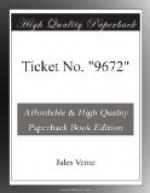“Above all, don’t take the trouble to come to Bergen to meet me, for it is quite possible that the ‘Viking’ will arrive at an earlier date than I have mentioned. However that may be, my dear Hulda can count upon seeing me at Dal twenty-four hours after we land. Don’t be too much surprised if I should arrive considerably ahead of time.
“We have had a pretty rough time of it, this past winter, the weather having been more severe than any our fishermen have ever encountered; but fortunately fish have been plenty. The ‘Viking’ brings back nearly five thousand quintals, deliverable at Bergen, and already sold by the efforts of Help Bros. And last, but not least, we have succeeded in selling at a handsome profit, and I, who have a share in the venture, will realize something quite handsome from it.
“Besides, even if I should not bring a small competence home with me, I have an idea, or rather, I have a presentiment that it is awaiting me on my return. Yes; comparative wealth, to say nothing of happiness! In what way? That is my secret, my dearest Hulda, and you will forgive me for having a secret from you! It is the only one! Besides, I will tell you all about it. When? Well, as soon as an opportunity offers—before our marriage, if it should be delayed by some unforeseen misfortune—afterward, if I return at the appointed time, and you become my wife within a week after my arrival, as I trust you will.
“A hundred fond kisses, my darling Hulda. Kiss Dame Hansen, and Joel, too, for me. In fancy, I imprint another kiss upon your brow, around which the shining crown of the brides of the Telemark will cast a saint-like halo. Once more, farewell, dearest Hulda, farewell!
“Your devoted lover,
“Ole Kamp.”
CHAPTER II.
Dal is a modest hamlet consisting of but a few houses; some on either side of a road that is little more than a bridle-path, others scattered over the surrounding hills. But they all face the narrow valley of Vesfjorddal, with their backs to the line of hills to the north, at the base of which flows the Maan.
A little church erected in 1855, whose chancel is pierced by two narrow stained-glass windows, lifts its square belfry from out a leafy grove hard by. Here and there rustic bridges cross the rivulets that dance merrily along toward the river. In the distance are two or three primitive saw-mills, run by water-power, with a wheel to move the saw, as well as a wheel to move the beam or the tree; and seen from a little distance, the chapel, saw-mills, houses, and cabins, all seem to be enveloped in a soft olive haze that emanates from the dark-green firs and the paler birches which either singly or in groups extend from the winding banks of the Maan to the crests of the lofty mountains.




